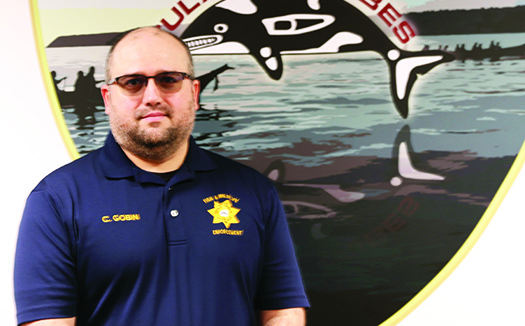
By Wade Sheldon, Tulalip News
Newly appointed Deputy Chief Christopher Gobin, a dedicated officer with 17 years of service with the Tulalip Police Department, said, “I had a negative experience with a state game warden when I was younger, and it left a bad taste in my mouth, and I didn’t want our tribal members to deal with people that don’t care.” This poignant experience served as a catalyst, propelling Gobin toward a career in law enforcement where honesty, fairness, and a deep connection to his tribal community would become the guiding principles of his service.
Said Christopher, “I felt honored when I was asked to be Deputy Chief. It sets an example for younger tribal members: I don’t have a college education, but I can still achieve a high leadership role with hard work and dedication. I went to the Army and came back and have been a police officer for the tribe ever since. I’ve worked my way up, and it shows these younger tribal members that they can achieve high levels of leadership in our tribe. It’s a lot more paperwork than out on the streets. Still, it’s an honor to put my fingerprints on the department, bring my knowledge of what the community has told me they need, and, as a community member, know where this department should be going.
I have a better understanding of what the tribe needs. It’s not someone outside the tribe trying to dictate what the tribe needs. I can listen to the community members; they trust me. So, I can coordinate with the police department and help the community get what it wants out of the police department.”
“The drug epidemic with fentanyl is probably an everyday thing with us,” Christopher explained. “It’s not only the crime that’s associated with people that are lost in addiction; it’s dealing with the mental health side of things also.” Gobin details the efforts to combat this: “We have bolstered our drug task force; five members are in it now. Every day, they are getting drugs off the street. Even one little pill can kill someone. So, if we can get one pill off the street, that’s one less chance of a tribal member dying.”
Looking ahead, Gobin outlines his goals, acknowledging the challenges faced by the police department: “Address the staffing issues; there’s so much more that we could be doing if we had the staff. Also, better training, with dedicated workers that spend 24/7 on the job and insufficient staff to take their place, makes it difficult to get extra training that is well needed.”
Building deeper bonds within the community is a crucial objective: “Getting the community know the police officers and see them as not just the police but also as people. This community does a good job of embracing our officers; I want to further that. It makes the community safer, and it makes the job safer.”
Recruitment of tribal members into the police department is a priority for Gobin: “My last goal would be to recruit tribal members to join the police department. It has been tough to get tribal members to work here. Building the police department with community members working and living in the community so they have that closer tie helps keep officers here. It builds the next generation of leaders.”
Christopher is an excellent example of how hard work, dedication, and a passion for the job can bring you to new heights and bring new opportunities to your life.
Christopher said, “Every day, I am going to try and do the best I can with my tools, and I will strive to make this a better police department. I want Tulalip to be where establishments like Marysville and Everett go. That’s what a police department should be.”